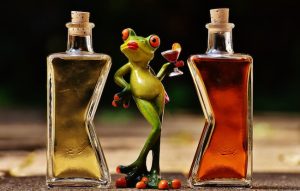Expertise, Skin care, Spotlights
Myths and facts: Organic alcohol in cosmetics

Apr
Whether as a drink, medicine or in the household, alcohol has been an integral part of everyday life for thousands of years. As an ingredient in natural cosmetics, however, it has come under fire from critics. What is myth and what is fact?
What is bio-alcohol? Organic alcohol is also known as ethyl alcohol, spirit of wine, spirits and colloquially as ethanol and is obtained through the natural fermentation of cereals (wheat, rye, corn), sugar or grapes. However, synthetic ethyl alcohol or denatured alcohol is not organic alcohol (INCI alcohol denat.). To produce denatured alcohol, ethyl alcohol is mixed with other substances to make it inedible.
Bio-alcohol is used in cosmetic and medical products in a variety of careful ways and is used as a solvent, antiseptic and disinfectant, as it destroys fungi, bacteria and viruses. But not only that, because bio-alcohol has many talents:
Conservation
Bio-alcohol is a safe and very effective preservative that is particularly important for water-based textures such as creams and lotions
Anti-inflammatory and healer
The antiseptic and anti-bacterial effect of organic alcohol has an anti-inflammatory effect on the skin and helps inflammations and blemishes heal more quickly
Active ingredient puller
Medicinal plants are packed full of healing substances. However, alcohol is often needed to release non-water-soluble active ingredients from the plant
Odour protection
In deodorising products - especially in deodorant - bio-alcohol helps to prevent unpleasant odours
It's the quantity that counts The properties mentioned are of course great - but say nothing about whether organic alcohol is good or bad for the skin. And as is so often the case when it comes to natural ingredients, the rule is: it depends. A high concentration of alcohol (around 30% - 40%) in a product can irritate and dry out the skin. This particularly affects the Mucous membranes but also the skin on the face and body.
Organic-certified cosmetics may only contain a very low percentage of alcohol and are therefore suitable even for dry or very sensitive skin. It is important to bear in mind that a large proportion of the organic alcohol evaporates when it is applied to the skin. Blemished and oily skin in particular benefits from organic alcohol in cosmetics: the alcohol has a cleansing and disinfecting effect. It kills bacteria and regulates the function of the sebaceous glands.
In comparison with other preservatives, organic kale is the absolute winner. Synthetic preservatives do not evaporate and can affect the hormone balance in the body and are therefore linked to breast cancer and the increasingly common thyroid disorders. Organic alcohol also has fewer possible side effects compared to other preservative methods and has the lowest potential to irritate the skin, outperforming acids, salts and benzyl alcohol. Another important factor is the wealth of experience that has been gathered with bio-alcohol over many years, which confirms its safety and tolerability time and time again.
Myth or fact? Organic alcohol is therefore a good ingredient as long as the concentration is low. This is the case with certified natural cosmetics. The only myth you should not succumb to is that ingredients are declared inaccurately or misleadingly. Because even with alcohol, organic is king!